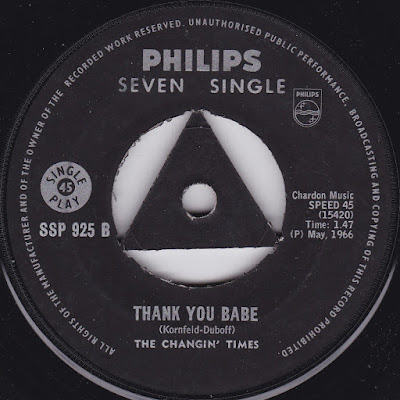Hello, my little post-Christmas tinkers. You may remember that back in October, I uploaded a brace of leftover singles in one entry which I could find very little to talk about. They'd been ripped to mp3 and their labels had been taunting me from my "action pile" for months (if not longer in one case).
This, then, is three more singles I've been meaning to upload for awhile, but really don't have much to say about. If there are any interesting facts about them you want to share, please do so in the comments section - but so far as I can tell and hear, there's nowt unusual or notable about these.
This, then, is three more singles I've been meaning to upload for awhile, but really don't have much to say about. If there are any interesting facts about them you want to share, please do so in the comments section - but so far as I can tell and hear, there's nowt unusual or notable about these.
Band: Amboy Dukes
Title: He Came To See Me Yesterday/ Easy Going Me
Label: Polydor
Year of Release: 1968
We talked about the British Amboy Dukes back in May 2015, introducing two of their singles. Therefore, my brevity this time is due to the fact that we already have this lot covered, not that they aren't interesting in and of themselves (they are - "High Life In Whitley Wood" is a single that's very high on my 'wants' list, and I occasionally spin "The Marquis" at Northern Soul nights).
"He Came To See Me Yesterday' is more of the same, really, though takes things at a steadier, gentler pace. Not one of their more 'in demand' sounds.
Band: I.P.O.H
Title: Caveman Billy/ Doggy
Label: Pye
Year of Release: 1973
IPOH stands for "In Pursuit of Happiness", and the group were led by Island of St Kitts ex-pat Hamilton King, and featured cult blues performer King Rollo in their ranks. This was their sole Pye release, and rather oddly is a cover of a Hot Chocolate B-side.
The flip, "Doggy" is a bit more interesting.
Artist: Fumble
Title: Mama, Don't You Hit That Boy/ Tonight
Label: DJM
Year of Release: 1979
Fumble were a rather popular rock n roll revival act in the 70s and 80s who, despite their keen live following, never quite managed to climb as high up the charts as Shakin Stevens, Darts, Showaddaywaddy or even Matchbox. Staggeringly, they even supported David Bowie on his "Ziggy Stardust" tour. Quoth the starman: "I adore them. They're very unpretentious about revamping that whole era".
So here they are, then, for your pleasure. There's also a website here.
Hello, my little post-Christmas tinkers. You may remember that back in October, I uploaded a brace of leftover singles in one entry which I could find very little to talk about. They'd been ripped to mp3 and their labels had been taunting me from my "action pile" for months (if not longer in one case).
This, then, is three more singles I've been meaning to upload for awhile, but really don't have much to say about. If there are any interesting facts about them you want to share, please do so in the comments section - but so far as I can tell and hear, there's nowt unusual or notable about these.
This, then, is three more singles I've been meaning to upload for awhile, but really don't have much to say about. If there are any interesting facts about them you want to share, please do so in the comments section - but so far as I can tell and hear, there's nowt unusual or notable about these.
Band: Amboy Dukes
Title: He Came To See Me Yesterday/ Easy Going Me
Label: Polydor
Year of Release: 1968
We talked about the British Amboy Dukes back in May 2015, introducing two of their singles. Therefore, my brevity this time is due to the fact that we already have this lot covered, not that they aren't interesting in and of themselves (they are - "High Life In Whitley Wood" is a single that's very high on my 'wants' list, and I occasionally spin "The Marquis" at Northern Soul nights).
"He Came To See Me Yesterday' is more of the same, really, though takes things at a steadier, gentler pace. Not one of their more 'in demand' sounds.
Band: I.P.O.H
Title: Caveman Billy/ Doggy
Label: Pye
Year of Release: 1973
IPOH stands for "In Pursuit of Happiness", and the group were led by Island of St Kitts ex-pat Hamilton King, and featured cult blues performer King Rollo in their ranks. This was their sole Pye release, and rather oddly is a cover of a Hot Chocolate B-side.
The flip, "Doggy" is a bit more interesting.
Artist: Fumble
Title: Mama, Don't You Hit That Boy/ Tonight
Label: DJM
Year of Release: 1979
Fumble were a rather popular rock n roll revival act in the 70s and 80s who, despite their keen live following, never quite managed to climb as high up the charts as Shakin Stevens, Darts, Showaddaywaddy or even Matchbox. Staggeringly, they even supported David Bowie on his "Ziggy Stardust" tour. Quoth the starman: "I adore them. They're very unpretentious about revamping that whole era".
So here they are, then, for your pleasure. There's also a website here.



















